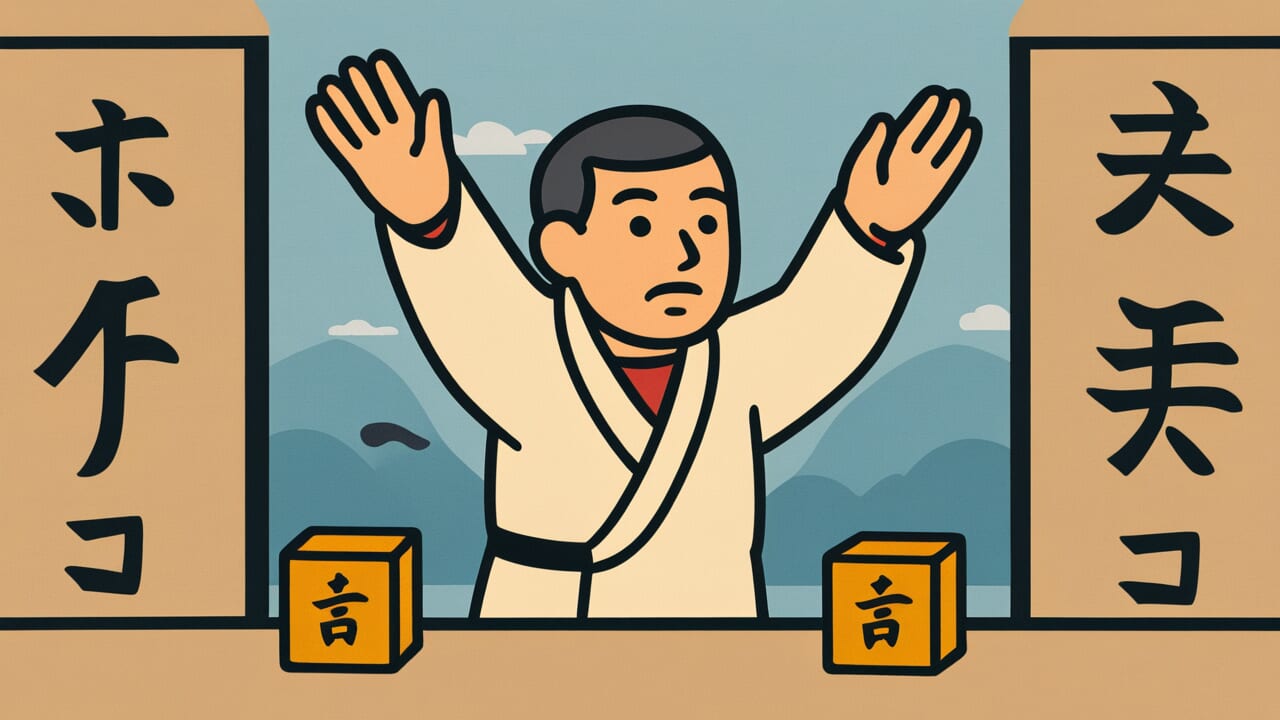How to Read “Whether it hits or misses, it’s divination”
Ataru mo hakke, ataranu mo hakke
Meaning of “Whether it hits or misses, it’s divination”
This proverb means that fortune-telling can be right or wrong, so you shouldn’t get too emotional about the results.
Don’t get too excited when you get a good fortune. Don’t get too depressed when you get a bad one. The saying teaches the importance of staying calm.
People use this proverb when someone worries too much about fortune-telling results. It reminds them not to take things too seriously.
You can also use it to calm yourself down when a prediction upsets you. Sometimes people use it for any uncertain predictions, not just fortune-telling.
Fortune-telling is still popular today. Morning TV shows have horoscopes. Magazines have fortune-telling sections.
This proverb says it’s fine to enjoy fortune-telling. But don’t let the results control you. Don’t lose sight of your own judgment. It teaches us the importance of balance.
Origin and Etymology
The word “hakke” in this proverb refers to a divination system from ancient China. Hakke represents eight natural phenomena: heaven, earth, thunder, wind, water, fire, mountain, and marsh.
These eight symbols combine to interpret all things in the universe. This divination method comes from the ancient Chinese text “I Ching.” It spread to Japan and influenced people’s lives for centuries.
The proverb reflects the basic nature of fortune-telling. Fortune-telling tries to predict the future, but the results aren’t always certain. Sometimes predictions come true, sometimes they don’t. That’s just how fortune-telling works.
What’s interesting is that this proverb doesn’t criticize fortune-telling. Instead, it encourages a calm attitude toward it.
During the Edo period, many fortune-tellers worked in towns. People used fortune-telling regularly in daily life.
In this environment, the proverb spread as practical wisdom. It taught people not to be controlled by fortune-telling results. The repetitive structure makes the message memorable and rhythmic.
It emphasizes that you should accept results the same way, whether good or bad.
Interesting Facts
Traditional hakke divination uses thin bamboo sticks called zekichiku. A set usually contains fifty sticks. One stick represents “taichi” and isn’t used.
The diviner divides the remaining forty-nine sticks through complex steps. This ritual process can take more than ten minutes. The divination itself becomes a time for mental focus.
The word “hakke” lives on in other Japanese expressions. “Hakkemi” means looking around everywhere. “Hakke na hito” describes a nosy person.
These expressions likely come from how hakke divination tries to see through all things.
Usage Examples
- Today’s horoscope was terrible, but whether it hits or misses, it’s divination, so I won’t worry about it
- The blood type compatibility test said you’re a bad match, but whether it hits or misses, it’s divination
Universal Wisdom
This proverb has survived because it captures something fundamental about human anxiety and how we cope with it.
Everyone wants to know the future. What will happen tomorrow? Is this choice right? What will my fate be?
This uncertainty creates anxiety. Throughout history and across cultures, this anxiety has given birth to fortune-telling.
But humans also have a dangerous tendency to depend too much on fortune-telling results. We get overjoyed by good results and devastated by bad ones.
We hand over control of our lives to uncertain external information.
This proverb understands human nature deeply. It teaches an important sense of balance. It doesn’t reject fortune-telling completely.
Instead, it acknowledges the uncertainty and encourages keeping a proper distance. Don’t let results control you. Keep your own judgment. This applies not just to fortune-telling but to all uncertain information and predictions.
Our ancestors understood something important. Anxiety about the future won’t disappear, but we don’t have to be controlled by it.
External information can be useful, but ultimately you decide your own life. This wisdom honors human dignity and autonomy.
In our information-saturated modern world, this wisdom means even more.
When AI Hears This
Whether fortune-telling “hits” or “misses” only becomes clear after the outcome. This structure is surprisingly similar to quantum mechanics’ measurement problem.
In the quantum world, an electron exists in a superposition state before observation. You can’t say it’s “here” or “there.” Only when you measure it does its position become definite. Fortune-telling has the same structure.
Consider a fortune that says “something good will happen tomorrow.” This prediction is actually vague. What counts as “something good” depends on the observer.
Finding 100 yen could be good. Laughing with friends could be good. Depending on interpretation, many things become “something good.”
The fortune’s result exists in superposition within the prediction. It becomes definite when you look back on your day and recognize “this was the good thing.” The act of observation creates reality.
Bohr, a founder of quantum mechanics, said “it’s meaningless to talk about unobserved reality.” This proverb’s essence is the same.
The correctness of fortune-telling doesn’t exist in the fortune itself. It exists in how you observe and interpret the results.
The fact that hakke, an ancient divination system, shares the same epistemological structure as modern physics shows the sharpness of human intuition.
Lessons for Today
This proverb teaches us how to deal wisely with uncertain information. Today we face more than just fortune-telling.
Economic forecasts, weather predictions, health information, and social media opinions surround us. All of this information is uncertain.
The key isn’t to ignore all information or believe it blindly. Use it as reference, but don’t let it control you.
Don’t get carried away by good information. Don’t get crushed by bad information. Keep your peace of mind.
Modern society makes us react strongly to online evaluations and predictions. Job acceptance forecasts, investment outlooks, relationship advice.
All of these are “whether it hits or misses, it’s divination.” Ultimately, external information doesn’t decide your life. Your own judgment and actions do.
This proverb cultivates healthy skepticism toward information. At the same time, it builds trust in your own judgment.
For those of us living with uncertainty, it offers priceless gifts: calmness and autonomy.



Comments